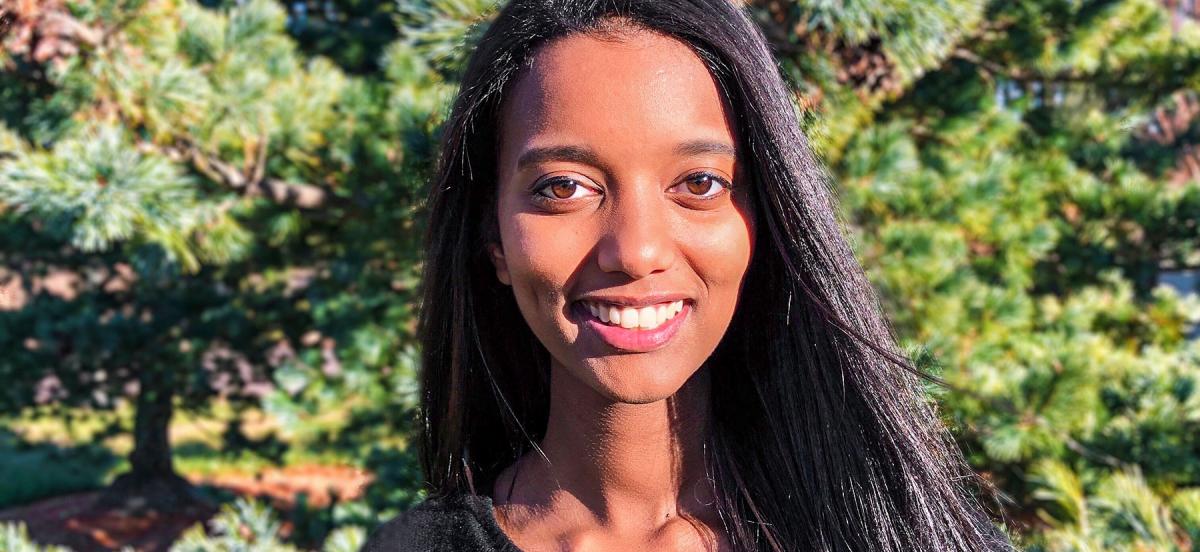Tsion Syoum ’21 Wins Fulbright Award to Study Water Policy in Uganda

Tsion Syoum '21, who started a nonprofit that builds sustainable sources of water for rural communities in Eritrea, is moving to Uganda to examine how local livelihoods around the Lake Victoria basin must be both adaptive and resilient in light of hydro-climatic disasters as part of her Fulbright Award.
Details
The environmental studies major will be based at Makerere University, researching how local livelihoods around the Lake Victoria basin must be both adaptive and resilient in light of hydro-climatic disasters.
Water is the source of life—and also of senior Tsion Syoum’s passion. In 2015, the daughter of immigrants from Ethiopia and Eritrea started a GoFundMe campaign to support the creation of a hand-pump well in the Eritrean village of Sheka Wedi Beserat, which became the seed of the Retaw Water Project, her nonprofit that has raised more than $45,000 to build sustainable sources of water for rural communities in Eritrea. It was that background in water accessibility that led Syoum to major in environmental studies at Haverford, and now she will turn her attention to water insecurity in a different East African nation—Uganda—as a Fulbright recipient.
“I applied to the Fulbright in Uganda because it was an opportunity to continue to do research that I am passionate about in a region that I closely identify with as first-generation American from East Africa,” said Syoum. “My hope is that my research will harness findings on how lakeshore communities cope with environmental shocks and propose adaptive strategies not only for Uganda, but East Africa at large. Armed with the knowledge from my nonprofit work in Eritrea, I will share my observation on how communities show resilience and adapt to environmental challenges. My analysis of these coping strategies will support people throughout East Africa.”
For her Fulbright, Syoum will move to Kampala, where she will use her Fulbright Open Study/Research Award to examine how local livelihoods around the Lake Victoria basin must be both adaptive and resilient in light of hydro-climatic disasters. Her research will be supported by Professor Jamiat Nanteza in the Department of Geography, Geo-Informatics, and Climatic Sciences at Makerere University.
“East Africa is one of the world's regions most vulnerable to the impacts of climate change,” said Syoum. “A growing result of climate change in Uganda is the irregular weather patterns that have led to frequent natural disasters, specifically flooding. In May 2020, water moved more than 13.12 meters ashore, the second highest on record since it rose to 13.46 meters in 1956. However, today’s rise in water levels has been worsened by environmental degradation and urbanization associated with previous droughts. This only intensifies the challenges faced by people whose lives and businesses are centered in areas at high risk for natural disasters and severe weather. The adaptive capacity of these people largely defines the extent to which they can cope with future environmental disasters caused by climate change.”
So Syoum’s work exploring how lakeshore residents perceive the changing effects of hydro-climatic disasters on their livelihoods will boost understanding not just of how people adapt to environmental challenges, but also the specific kinds of hydro-climatic disasters East Africa is currently confronting.
After her Fulbright year, Syoum plans to continue her journey in water policy and sustainability that began with that first Eritrean well in 2015. She expects to head to the U.K. to earn a master’s degree in environmental policy following her year in Uganda, and then hopes to pursue a law degree with a focus on environmental law.
“Ultimately,” she said, “with the knowledge I have acquired through my studies and Fulbright research, I will return to East Africa, where I hope to explore new ways to manage hydro-climatic disasters and water pollution through policymaking.”
Read more about Fords who have won fellowships, scholarships, or grants.



